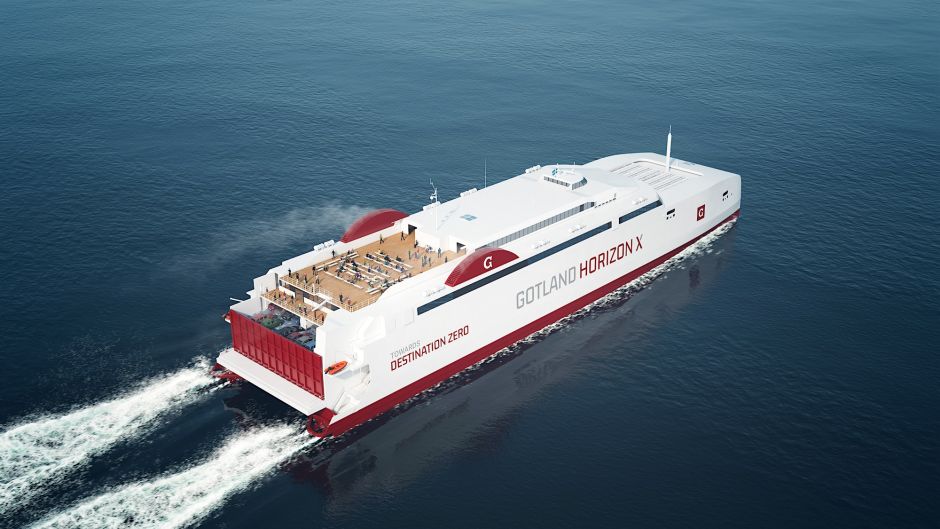New Postdoctoral Position in Hydrogen Research for Shipping

Anyone with expertise in thermodynamics and experience working with hydrogen supply systems might soon have an interesting challenge to tackle. Uppsala University has just announced a two-year postdoctoral position located at Campus Gotland. The position is funded by Gotlandsbolaget to support research aimed at achieving fossil-free, hydrogen-powered transport to and from Gotland.
For the past three years, Uppsala University and Gotlandsbolaget have collaborated on several large projects with the goal of making Gotland’s ferry traffic fossil-free by 2045, using hydrogen as fuel. However, the first ferries with the capability to run on hydrogen, Gotland Horizon and the catamaran Horizon X, could be delivered within just a few years. The technology to develop and design ships powered by fossil-free hydrogen, emitting primarily water vapor, is already largely available. The big challenge lies in how to refuel these ships with green hydrogen.
“If refueling can’t be done quickly enough, the concept of using hydrogen becomes less feasible,” says Björn Samuelsson, a researcher at the Department of Industrial Engineering and Civil Engineering at Uppsala University, Campus Gotland.
When refueling hydrogen, it must be cooled to prevent the engine’s cylinder temperature from rising too high. For road traffic, this has been solved by cooling hydrogen to -40°C before refueling vehicles. But it’s one thing to cool 50 kilograms of hydrogen for a truck in 7-8 minutes, and quite another to cool the 16 tons needed to refuel a ferry. And it needs to be done in 45 minutes—the turnaround time between trips during Gotland’s peak season.
“In theory, you could use trailers that each hold about one ton of hydrogen and line them up. But not only would that be very expensive, the emergency services and other authorities would undoubtedly have opinions on transporting more than 50 trailers of hazardous materials through Visby harbor every day during the busy summer season. There’s clearly a better solution, but today none is obvious. We need an open mind to solve this,” says Björn Samuelsson.
A couple of Lighthouse pre-studies have laid the groundwork for the challenges of distributing and bunkering hydrogen. The research process is now moving forward toward solutions within a larger project. This is where the new postdoctoral position comes into play – a two-year role funded by a donation from Gotlandsbolaget, which further deepens the collaboration between the shipping company and Uppsala University’s Campus Gotland.
“We’re looking for someone who understands thermodynamics and has preferably worked with hydrogen filling issues. We know that no one has done this for shipping, but if you’ve worked on land-based solutions, you’ll understand the problem. The candidate should also be skilled in communication, both locally and internationally, with the shipping industry. We conduct applied research, so it’s crucial to communicate with the industry. Ideally, we’d like to hire someone who’s willing to stay on Gotland.”
Finding someone who meets all the criteria is not easy, at least not in Sweden.
“We think there are researchers in Japan and South Korea who meet our scientific criteria. Norway and Germany could also be good places to search. In Sweden, there are a few working on this, but they are in the process of writing their doctoral theses. So we’re about a year too early for them.”
The position needs to be filled as soon as possible, which likely means by Christmas or early next year.
“It’s fantastic that Gotlandsbolaget is taking this step. It demonstrates their seriousness in wanting to drive development forward and shows they understand the importance of both focusing on their own industrial development and collaborating with others in the industry. And for Uppsala, this is actually a unique donation. Historically, very few donations have been made for this type of applied research, and for Campus Gotland, it’s the first ever,” says Björn Samuelsson.
Gotlandsbolaget is also pleased with the collaboration.
“We are working to transition Gotland’s ferry service, and this transition must be both climate and economically sustainable. Gotlandsbolaget is investing significant resources to stay at the forefront, and we believe our contribution to enabling applied research in this area is a key part of the shift, not just for Gotland’s ferry traffic but for the shipping industry as a whole,” says Håkan Johansson, CEO of Gotlandsbolaget, on the company’s website.
-
 Ny studie: Eldrivna pendelbåtar kan effektivisera Stockholms kollektivtrafik
Ny studie: Eldrivna pendelbåtar kan effektivisera Stockholms kollektivtrafik -
 EU: Sjöfartens utsläpp ökar
EU: Sjöfartens utsläpp ökar -
 Sociala relationer påverkar val av bränsle
Sociala relationer påverkar val av bränsle -
 Sjöfartens omställning kräver ”mjukare” påtryckningar
Sjöfartens omställning kräver ”mjukare” påtryckningar -
 Hon hade avtalad tid med Kapten ynkrygg
Hon hade avtalad tid med Kapten ynkrygg -
 Lighthouse omvärldsanalys 2025 – osäkerhet och tullar präglar sjöfarten
Lighthouse omvärldsanalys 2025 – osäkerhet och tullar präglar sjöfarten -
 Se seminariet Shipping in the Marine Environment
Se seminariet Shipping in the Marine Environment -
 Vad betyder egentligen de 90 procenten?
Vad betyder egentligen de 90 procenten? -
 Hålla där...
Hålla där... -
 Ny rapport: Klimatförändringarna ett hot mot de flesta större hamnar i världen
Ny rapport: Klimatförändringarna ett hot mot de flesta större hamnar i världen

